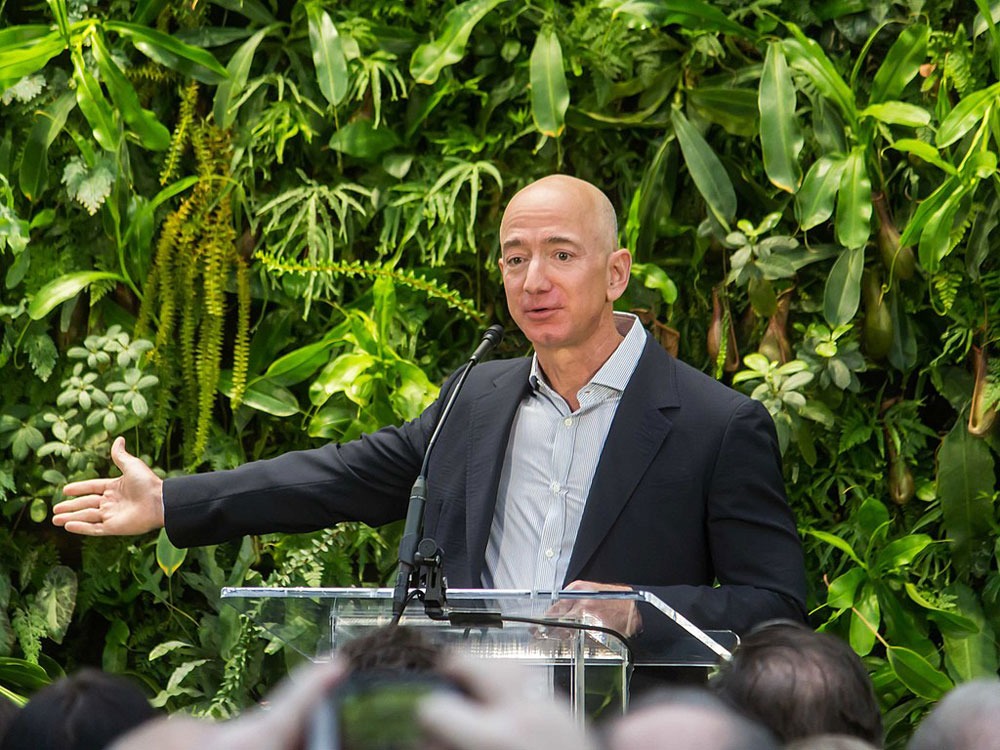
February 17, 2020; New York Times and Vox, “Recode”
One of the richest men in the world, Amazon’s founder Jeff Bezos, has made a philanthropic move of gargantuan size. Earlier this week, he announced via Instagram the launch of the Bezos World Fund, powered by an initial commitment of $10 billion to combat the coming climate calamity. (This works out to about 7.5 percent of his net worth.) How are we to greet this gesture? As a welcome act at a moment when evidence of catastrophic change is all around us? Or something more worrisome, raising as it does the specter of wealthy individuals using their largesse as a self-protective tool that avoids real solutions?
“Climate change is the biggest threat to our planet,” Bezos writes. “I want to work alongside others both to amplify known ways and to explore new ways of fighting the devastating impact of climate change on this planet we all share. This global initiative will fund scientists, activists, NGOs—any effort that offers a real possibility to help preserve and protect the natural world. We can save Earth. It’s going to take collective action from big companies, small companies, nation states, global organizations, and individuals.”
Some members of Amazon’s workforce have been pushing Bezos to clean his own house first. In a statement, Amazon Employees for Climate Justice said that although they applauded his ostensible generosity, “one hand cannot give what the other is taking away.”
The people of Earth need to know: When is Amazon going to stop helping oil and gas companies ravage Earth with still more oil and gas wells? When is Amazon going to stop funding climate-denying think tanks like the Competitive Enterprise Institute and climate-delaying policy?
A similar concern came from outside Amazon when, according to Vox, Greenpeace called out Bezos in a tweet, writing, “Why is Amazon providing advanced computing technologies to the oil and gas industry so it can discover and drill more oil, more efficiently? Jeff Bezos—if you want a climate safe future that OIL MUST STAY IN THE GROUND.”
Data released by Amazon shows that in 2018, it was responsible for the release of 44.4 million metric tons of carbon dioxide. Bruno Sarda, president of the nonprofit watchdog CDP North America, put this in context when he said, as reported by the New York Times, “That would put them in the top 150 or 200 emitters in the world,” just 15 percent smaller Switzerland and Denmark. Last fall, Bezos pledged that Amazon would become carbon neutral by 2040 and asked other major companies to do so as well. Bezos’s strategy calls for greater use of renewable energy and electric vehicles but does not include cutting profitable business ties with the fossil fuel industry.
Sign up for our free newsletters
Subscribe to NPQ's newsletters to have our top stories delivered directly to your inbox.
By signing up, you agree to our privacy policy and terms of use, and to receive messages from NPQ and our partners.
The ability to make large gifts combined with an entrepreneur’s mindset is very dangerous. Privately owned businesses do not operate in the same way as public institutions must. Accountabilities are different. As the Institute for Local Self-Reliance’s co-director Stacy Mitchell told Common Dreams, “It’s the power to decide who matters, how problems are defined, what ‘solutions’ count, and so on…this is another way for Bezos to wield still more power over our society.”
Author Anand Giridharadas, who has been a frequent critic of the self-protectiveness of the One Percent, asked, “Will Jeff Bezos further entrench the power divide through the administration of this donation? Or will he give the people who have a legitimate claim to a lot of that money—workers not paid enough in wages, and communities not paid enough in taxes—a say in the project?”
Bill McKibben, the author of The End of Nature and co-founder of 350.org, worried in comments to Vox that the Bezos World Fund will not be ready to support the systemic changes that are known ways to limit the harm of a changing climate that might cost Amazon and Mr. Bezos.
We’ve got some solutions available already, but we’re not deploying at anything like the speed we need—that’s the ongoing power of the fossil fuel industry at work. The only way to break that power and change the politics of climate is to build a countervailing power. Our job—and it’s the key job—is to change the zeitgeist, people’s sense of what’s normal and natural and obvious. If we do that, all else will follow…you don’t even need $1 billion, never mind $10 billion, to do this. Look at the amount of good Greta Thunberg and her young colleagues have done while barely spending a nickel.
Alan Robock, an environmental science professor at Rutgers University, made an even sharper observation. “I always say it’s more important to change your leaders than to change your lightbulbs. We need government action, both in regulations and in incentives. The problem is the selfish fossil fuel industry, which has captured the Republican Party and the White House. So I would spend my billion dollars getting Democrats elected to Congress and the presidency. They would then enact the policies we need.”
If the solutions to climate change require difficult and personally costly actions, will the Bezos World Fund be ready to support them? Or will it follow the trend of Bezos’s peers as they look for silver-bullet solutions? Will he see himself responsible to anyone but himself?—Martin Levine\













